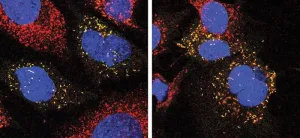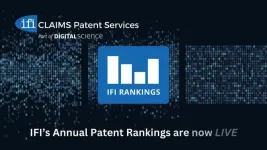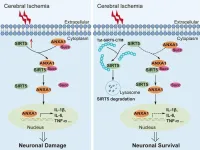(Press-News.org)
Luxembourg, 9 January 2024 – In a new position paper, and following engagement with its national members and the European Working Group of People with Dementia (EWGPWD), Alzheimer Europe calls for concrete actions to enable timely, safe and equitable access to anti-amyloid drugs, for patients who are most likely to benefit from these innovative new treatments for Alzheimer’s disease (AD).
The growing prevalence and impact of AD has catalysed huge investments in research on its causes, diagnosis, treatment and care. After many high-profile failures, recent clinical trials of anti-amyloid drugs have marked a turning point for the field, leading to the approval of the first disease-modifying therapies for AD in the US. European regulators are currently evaluating whether there is sufficient evidence to approve these drugs for patients with mild cognitive impairment (MCI) or mild dementia due to AD.
Anti-amyloid drugs represent a new hope for people with AD. Classed as disease-modifying therapies, drugs such as lecanemab and donanemab can slow the progressive, clinical decline associated with AD, with the potential to give patients more time in the less symptomatic stages of the disease. However, the benefits and risks of initiating treatment with anti-amyloid drugs are multifaceted and complex, as are the patterns of evidence and effectiveness from clinical trials.
Access to anti-amyloid drugs hinges entirely on a timely and accurate diagnosis of AD, in the MCI or mild dementia stages, with biomarker confirmation of AD pathology. However, diagnosing AD remains challenging in clinical practice, excluding many from accessing patient-centred support, care and treatments. Currently, European healthcare systems are inadequately resourced to provide a timely diagnosis, let alone equitable access to anti-amyloid drugs, for all people with early AD who could benefit from treatment.
The Alzheimer Europe position paper addresses questions of anti-amyloid drug efficacy, safety and cost, highlighting three priority areas to ensure equitable access to these innovative treatments: effective communication of risks and benefits; an accurate, timely diagnosis; and healthcare systems preparedness. To address these challenges, Alzheimer Europe calls for concrete actions from industry, regulators, payers, healthcare systems and governments. These include:
Accessible, inclusive communication of the benefits and risks of anti-amyloid drugs, so patients can weigh the potential slowing of clinical decline against the side effects, financial costs and logistical burdens of treatment;
The adoption of realistic, sustainable pricing policies for anti-amyloid drugs, coupled with clear reimbursement frameworks that reflect the true value of treatment for patients and society, without impacting the coverage of existing therapies that are hugely valued by people with dementia and their carers/supporters;
Development of patient registries for long-term collection of real-world evidence on the efficacy and safety of anti-amyloid drugs, including data on outcomes that are meaningful for patients and their carers/supporters;
Investment in infrastructures for diagnosis and treatment, with expansion of workforce capacity and capability supported by clear guidance on drug eligibility, and parameters for treatment initiation, safety monitoring and discontinuation;
Implementation of biomarker-guided clinical pathways which support the diagnosis and treatment of AD in the early stages of disease, integrated alongside existing pathways focused on managing the symptoms of later-stage dementia;
Continued investment in the development of diagnostics and treatments for other causes and stages of dementia, as well as support and care services that can help people live well with dementia at all stages.
Commenting on the position paper, Alzheimer Europe’s Executive Director, Jean Georges, stated:
“If anti-amyloid drugs are approved by European regulators, these innovative treatments should be accessible for patients most likely to benefit, with clear protocols to exclude those most likely to suffer serious side effects. Fair pricing policies are crucial, to support broad coverage and reimbursement. The development of disease-modifying therapies for early AD marks a turning point in the fight against the disease. However, the needs of people with more advanced AD, or less common forms of dementia, must not be overlooked. Research into other treatment options is essential, including symptomatic treatment for people with more advanced dementia, and preventative approaches throughout the lifecourse."
Our full position paper can be accessed on the Alzheimer Europe website:
https://www.alzheimer-europe.org/policy/positions/alzheimer-europe-position-anti-amyloid-therapies
For further information, contact:
Jean Georges, Executive Director of Alzheimer Europe, 14, rue Dicks, L-1417 Luxembourg, Tel.: +352-29 79 70, Fax: +352-29 79 72, jean.georges@alzheimer-europe.org www.alzheimer-europe.org
Notes to editors:
Alzheimer Europe is the umbrella organisation of national Alzheimer associations and currently has 42 member organisations in 37 European countries. Our mission is to change perceptions, policy and practice in order to improve the lives of people affected by dementia.
The European Working Group of People with Dementia was launched by Alzheimer Europe and its member associations in 2012. The group is composed entirely of people with dementia, who are nominated by their national Alzheimer associations. They work to ensure that the activities, projects and meetings of Alzheimer Europe duly reflect the priorities and views of people living with dementia. The Chairperson is also an ex-officio member on the Board of Alzheimer Europe with full voting rights.
END
For the first time, a research team at The Hospital for Sick Children (SickKids) has uncovered a way to potentially reduce the amount of toxic cellular waste accumulating in patients with Zellweger Spectrum Disorder (ZSD).
ZSD is a group of rare, neurodegenerative genetic conditions caused by genetic variations that reduce the number of peroxisomes – the parts of cells that are responsible for, among other tasks, breaking down fats. ZSD varies in severity and is characterized by progressive neurodegeneration as well as symptoms that range from visual impairments, such as cataracts, to liver and kidney disfunction.
Like all living ...
A study published today in IOP Publishing’s journal Environmental Research: Infrastructure and Sustainability has found that green ammonia could be used to fulfil the fuel demands of over 60% of global shipping by targeting just the top 10 regional fuel ports. Researchers at the University of Oxford looked at the production costs of ammonia which are similar to very low sulphur fuels, and concluded that the fuel could be a viable option to help decarbonise international shipping by 2050.
Around USD 2 trillion will be needed to transition to a green ammonia fuel supply chain by 2050, primarily to finance ...
New Haven, Conn., Jan. 9, 2024—U.S. patent grants declined 3.4% from 2022, the lowest level since 2019, and Samsung held onto the top spot for the second year in a row according to IFI CLAIMS Patent Services, world leader in tracking patent application and grant data.
IFI CLAIMS Patent Services is a Digital Science company that compiles and tracks data from the U.S. Patent and Trademark Office (USPTO) and other patent-issuing agencies around the globe. IFI translates its world-leading data into an annual U.S. Top 50 and IFI Global 250 patent rankings, providing valuable insights into companies’ R&D activity.
Other findings in IFI’s latest rankings include patent powerhouse ...
A combination of only 11 proteins can predict long-term disability outcomes in multiple sclerosis (MS) for different individuals. The identified proteins could be used to tailor treatments to the individual based on the expected severity of the disease. The study, led by researchers at Linköping University in Sweden, has been published in the journal Nature Communications.
“A combination of 11 proteins predicted both short and long-term disease activity and disability outcomes. We also concluded that it’s important to measure ...
Children who develop neuroblastomas, a rare form of cancer which develops in nerve cells, may benefit from receiving certain anti-tumour drugs as well as chemotherapy, a new trial has found.
The results of the BEACON trial conducted by the Cancer Research UK Clinical Trials Unit at the University of Birmingham found that combining anti-angiogenic drugs, which block tumours from forming blood vessels, alongside various chemotherapy drugs led to more young people seeing their tumours shrinking, from 18% in the control group to 26% among those on Bevacizumab.
The findings are published in the Journal of Clinical Oncology today. The trial saw 160 young ...
The European Commission has accepted the EBRAINS 2.0 proposal submitted in response to the INFRASERV call, granting €38 million for the further development of services of the EBRAINS research infrastructure.
The European Commission has signed a grant agreement to fund EBRAINS with €38 million until 2026. Over the next three years, the infrastructure will continue to develop tools and services to widely serve research communities in neurosciences, brain medicine, and brain-inspired technologies.
EBRAINS (European Brain Research Infrastructures) is an EU co-funded collaborative research platform designed to advance neuroscience and brain ...
An international research team has shown that the debilitating impact of tinnitus can be effectively reduced in just weeks by a training course and sound therapy delivered via a smartphone app.
The team from Australian, New Zealand, French and Belgian universities report these findings today in Frontiers in Audiology and Otology.
It offers some hope for millions affected by tinnitus who:
have been told that there is nothing they can do about it
face long queues waiting for treatment, or
can’t afford the costs of specialist support.
The initial trial worked with 30 sufferers, of whom almost two thirds experienced a ‘clinically ...
Osaka, Japan – From alleviating your allergy symptoms to optimizing herbicide performance, alkylamines are molecules that have many uses. Unfortunately, common methods of producing alkylamines result in harmful waste byproducts. A method of synthesizing alkylamines in a sustainable yet cost-effective way has thus been highly sought after.
Now, in a study recently published in Green Chemistry, a research team led by Osaka University has found a way. The team has developed a method of alkylamine synthesis that works under mild conditions and produces ...
Butterfly populations in Catalonia in northern Spain are better than their UK counterparts at regulating their body temperature by basking in the sunshine, but rising global temperatures due to climate change may put Spanish butterflies at greater risk of extinction.
An international study, led by the University of Cambridge and the Institut de Biologia Evolutiva (IBE) in Barcelona, found that butterflies use different methods to regulate their body temperature. In Catalonia, butterflies tend to angle ...
This study is led by Dr. Xing Li and Dr. Yilin Zhao (Department of Anesthesiology, Hubei Key Laboratory of Geriatric Anesthesia and Perioperative Brain Health, and Wuhan Clinical Research Center for Geriatric Anesthesia, Tongji Hospital, Tongji Medical College, Huazhong University of Science and Technology). The team's previous research found that the increase in SIRT5 in microglia induced by ischemic stroke causes annexin-A1 (ANXA1) desuccinylation, which decreases ANXA1 membrane recruitment and secretion but promotes ANXA1 nuclear translocation, resulting in the production of proinflammatory ...








